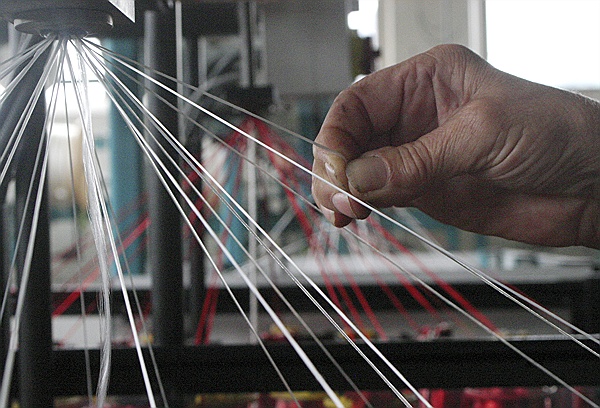Swiss firms also face price pressures at home

The beleaguered Swiss export industry is now facing the reality of foreign companies undercutting their products in the Swiss market as well as abroad.
Many Swiss firms that export goods to the eurozone also supply parts domestically. The mechanical and electrical engineering sector is bracing itself for a flood of cheaper imports as foreign competitors take advantage of exchange rates.
While the expected round of price cutting would benefit buyers of such products – and perhaps also consumers – it could spell more trouble for local industries and hasten further job cuts.
Josef Maushart, chief executive and chairman of precision tools manufacturer Fraisa, sounded the warning at a conference of the mechanical and electrical engineering umbrella group Swissmem on Tuesday.
“This is a problem that has not received much coverage,” he told swissinfo.ch. “Up until now, importing companies have not reduced their prices too much. But if they see the current exchange rates staying for the long term they will use this to their advantage by reducing their prices in Switzerland.”
“We might have to start reducing our prices in Switzerland as a result of cheaper imported goods,” he added.
Jobs shed
Faced with the prospect of the franc reaching parity with the euro, the Swiss National Bank (SNB) set a floor exchange rate of SFr1.20 to the euro in September. The target rate has so far been successfully defended, but manufacturers complain that they are still uncompetitive in the eurozone market.
Swissmem President Hans Hess believes 10,000 jobs are at stake in the sector with Swiss goods trading at a 10 to 15 per cent premium to competitors in European countries.
“We will have to reduce that gap either by directly cutting jobs or by moving production to neighbouring countries – which would also result in a loss of jobs in Switzerland,” he told swissinfo.ch.
Fraisa has so far avoided slashing jobs by fixing its purchasing costs at SFr1.34 against the euro with long term contracts. But Maushart has predicted a 40 drop in profits before tax and interest payments in 2012 when the contracts expire at the end of the year.
More than half of this margin erosion could take place in the Swiss market as prices fall, Maushart predicted. Fraisa supplies parts for watch makers, medical equipment manufacturers, machine builders and for the aviation industry.
Credit squeeze
To counter the expected losses, Fraisa is investing SFr18 million ($20 million) in new technology to make production more efficient. The company also has the option of placing some of its 210 Swiss-based staff on shortened working hours or moving more production to Germany or Hungary – contingencies it wants to avoid if at all possible.
However, the company could also be indirectly buffeted by credit shortages if the European debt crisis gets much worse. Although Fraisa forecasts no credit problems in Switzerland, customers in Europe might not fare so well, Maushart told swissinfo.ch.
“The biggest European banks have been told to increase their equity in relation to credit volumes,” he said. “We fear that banks will not only increase their equity base but could also reduce credit volumes, making it harder for our customers to gain credit.”
Maushart added that signals from Italian and Hungarian clients strongly pointed to the problem gathering pace next year.
Numbers worsen
A survey of Swissmem members found that 36 per cent of firms are now moving into loss making territory as a result of the strong franc. Export prices fell by 4.8 per cent in the first nine months of this year to compensate for the unfavourable exchange rates.
Two thirds of companies are now reporting that the franc has seriously affected their business, compared to just over half of firms during a February survey.
Swissmem repeated calls for the SNB to weaken the franc further and for the government to initiate long term incentives such as tax cuts and further liberalising the Swiss energy sector.
Hess denied that private sector was asking for state hand-outs to survive, but was rather petitioning the authorities to give companies some breathing space.
“If the problems we are experiencing were part of a long-term trend over the past decade I could understand criticism of businesses asking for help,” Hess told swissinfo.ch. “But we have witnessed a sudden and substantial strengthening of the franc.”
“All we asking for is that the government creates the framework that gives us enough time to resolve these problems,” he added.
A Swissmem survey of 280 companies (representing 28% of the group’s membership) found that more than a third are now making losses as a result of the strong franc (28% in February’s survey).
More than half of the respondents said margins had been eroded by at least 6% – seen as a danger point by the industry.
Two thirds of firms said their business had been “seriously impacted” by the strong franc – up from 54% in February’s survey.
The picture was not all gloom and doom, with a 3.9% increase in sales for the first nine months of 2011 plus a 6.4% rise in new orders.
But a third of companies (compared to 14% in February) now expect orders to decline in the near future.
Some 17% of firms had already shed jobs with another 28% saying they planned to do so in the near future.
Swissmem companies export 80% of their goods, with the EU market taking two thirds of these exports and the United States a fifth.

In compliance with the JTI standards
More: SWI swissinfo.ch certified by the Journalism Trust Initiative













You can find an overview of ongoing debates with our journalists here . Please join us!
If you want to start a conversation about a topic raised in this article or want to report factual errors, email us at english@swissinfo.ch.